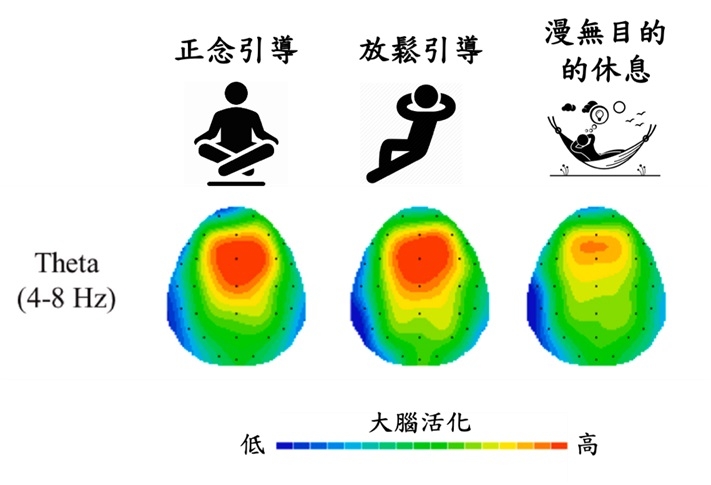“This report was provided by the research team of Chair Professor Yu-Kai Chang from the Department of Physical Education and Sport Sciences.”
Article Source: Office of Research and Development, NTNU – Research Highlights (2023-11-12)
Original Link: https://rh.acad.ntnu.edu.tw/tw/article/content/243
(English Version Powered by ChatGPT, Edited by Serena H.)
Elite athletes constantly endure immense pressure, often leading to anxiety, nervousness, and unease—negative psychological states that can directly hinder athletic performance. As a result, mental health among athletes has long been a key focus. Identifying effective psychological strategies that enhance both mental health and performance has become one of the most important topics in the field of sport psychology.
To investigate how different psychological strategies benefit athletes’ mental health—and to explore the brain mechanisms involved—a research team recruited 35 track and field athletes in a randomized crossover experiment. They compared the immediate effects of a single 30-minute session of guided mindfulness practice and self-directed progressive muscle relaxation on anxiety and emotional states. Neurophysiological techniques were used to analyze brain activity during the two mental strategies. Results showed that, compared to passive resting, both mindfulness and relaxation practices engaged more cognitive resources in the prefrontal cortex and significantly reduced negative emotional states. This study provides evidence-based guidance for athletes to choose mental strategies that support their mental well-being and performance during training and competition.
The Challenges Faced by Elite Athletes
Since the 2021 Tokyo Olympics, the mental health of athletes has received growing global attention. With evolving times and increasingly intense competition, athletes are facing more pressure than ever—not only from rigorous training and high-stakes events but also from finances, relationships, media exposure, injury rehabilitation, and, in the case of student-athletes, academic demands.
Athletes are often expected to suppress emotions such as fear or vulnerability, and instead display physical toughness and mental resilience. These stereotypes impose additional invisible pressures. Maintaining athletes’ mental health has thus become an essential issue in the development of modern sports.
Psychological Strategies to Promote Performance and Mental Well-Being
Psychological Skills Training (PST)—such as relaxation techniques, self-talk, and imagery training—is one of the most commonly used psychological interventions to improve both athletic performance and mental health. Recently, Mindfulness-Based Interventions (MBIs) have gained attention as a novel form of psychological skills training.
However, the question of which method—PST or mindfulness—is most effective remains debated. Comparing their immediate effects on psychological states can help clarify their benefits and provide a practical basis for strategy selection. Furthermore, it’s intriguing to explore how these strategies differentially affect brain activity in athletes.
To address this, the research team conducted a study and published their findings in 2023 in the journal Psychology of Sport and Exercise.
Say Goodbye to Anxiety and Negative Emotions by Focusing on the Right Strategy
This randomized crossover trial revealed that both a single 30-minute session of guided mindfulness and self-directed relaxation were more effective than passive rest in immediately reducing athletes’ anxiety and negative emotions.
Additionally, both interventions were associated with increased theta wave activity in the prefrontal cortex (Figure 1), indicating greater cognitive engagement during these practices to cope with negative emotional states. These results offer preliminary evidence comparing mindfulness and traditional psychological skills training, suggesting that when applied with focus and accuracy, either method can effectively improve athletes’ immediate mental health—and help them perform at their best.
Original Source:
Nien, J. T., Gill, D. L., Chou, T. Y., Liu, C. S., Geng, X., Hung, T. M., & Chang, Y. K. (2023). Effect of brief mindfulness and relaxation inductions on anxiety, affect and brain activation in athletes. Psychology of Sport and Exercise, 67, 102422.
https://doi.org/10.1016/j.psychsport.2023.102422
About the Researcher
Prof. Yu-Kai Chang
Chair Professor, Department of Physical Education and Sport Sciences, National Taiwan Normal University (NTNU)
Vice Chair, Department of Physical Education and Sport Sciences
Director, Cognitive Neuroscience of Physical Activity Lab
Prof. Chang currently serves as Treasurer of the International Society of Sport Psychology (ISSP), Vice President of the Asian-South Pacific Association of Sport Psychology, Vice President of the Taiwan Society of Sport Science. He is also recognized as one of the world’s top 2% scientists since 2021, Prof. Chang has received multiple awards, including:
- Wu Ta-You Memorial Award (2012)
- Outstanding Research Award from Taiwan’s Ministry of Science and Technology (2018)
- Early Career Awards from ISSP, NASPSPA, and the Chinese Association of Sport Psychology
- UNC’s Best Dissertation Award
His research focuses on fitness and sport psychology, especially the use of cognitive neuroscience to explore exercise, mental health, performance psychology, and mindfulness. He is Co-Editor-in-Chief of the International Journal of Sport and Exercise Psychology (SSCI) and Editor-in-Chief of Taiwanese Journal of Sports Science (TSSCI).
He is also trained in traditional martial arts (Bagua, Xingyi, Taichi, Shaolin) and serves as a consultant for the Bagua Dao-Yin Center.

圖1:相較於漫無目的的休息,運動員在正念引導與放鬆引導期間表現出更多額葉Theta波活化,意味著運動員因專注於兩種練習的引導中,持續招募較多的認知資源。